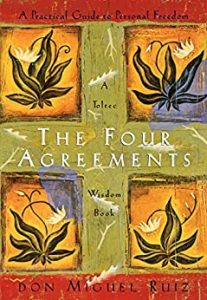The ideas outlined in the book The Four Agreements: A practical guide to personal freedom (A Toltec wisdom book) by Don Miguel Ruiz bring the opportunity to observe your own truth and to live your own truth. It is wonderfully easy to read. Indeed, the ideas presented are so concise and simple as to mask the incredible power of the content. It is worth reading repeatedly to allow the wisdom to really sink in.
Don Miguel Ruiz is part of a lineage that conserves spiritual knowledge. This book shares the teachings of the Toltec, a pre-Colombian Mesoamerican culture that ruled a state centered in Tula, Hidalgo, Mexico. It is for anyone seeking happiness who is open to self-exploration. It provides hope and pointers for transformation by describing four practices or agreements that will bring greater happiness. However, beyond setting the intention to carry out these practices there is not much guidance as to the actual experience of engaging in committed continuous practice over time.
The Four Agreements
The four agreements are:
- be impeccable with your word – which means to know and speak your truth.
- don’t take anything personally – which means understanding that what you hear is about the other persons’ truth and not your own.
- avoid making assumptions – which means questions every perceived possibility provided by yourself and others.
- always do your best – which means loving and enjoying what you are engaged in even as the amount of energy you have available varies.
The basis for these agreements is the mind. The mind can give punishment (act as a judge) and receive punishment (act as a victim). The mind can interact with itself since part of the mind speaks and part of the mind listens. In other words, it can observe and listen to the stream of consciousness and it can add new items to the stream of consciousness to direct or influence it. This means that it can monitor the agreement or lack of agreement between the many different thoughts crossing the mind. Any lack of agreement is indicated by discordant emotion.
It is possible to confront the judge and victim by (a) facing our fears one by one, (b) reducing negative emotions so there is no more fuel, or (c) symbolic death of the separate “I”. Each of these options is made easier by using forgiveness and compassion to shift to self-love and self-acceptance.
The book is easy to read but bears deeper contemplation to see how it speaks to unraveling our social conditioning. This early programming keeps us psychically safe but distances us from life itself and then it is up to us to reengage.
The Three Masteries
According to the ancient Toltec wisdom, there are three masteries
- Mastery of awareness. This is full-knowing of who we are with all the possibilities available to us
- Mastery of transformation. This is how to change to be free of domestication (to stop running socially conditioned programs).
- Mastery of intent. This transformation of energy is possible when you choose to live from life itself or from a place of unconditional love.
This content can be used in coaching to shift into taking action from inspired and positive focus without resistance. The principles can be part of a daily inquiry. The intention might be to reveal personal truths, become aware of assumptions, and notice where you victimize or are victimized.
This text is a favorite of mine that highlighted the need to use your word wisely. The phrase “In the beginning, there was the word” gives new respect for its creative power. The keys to our daily experience really are in what we say and think.
Check out my Self Alignment Program to learn more about up-leveling your own use of the Law of Attraction.

